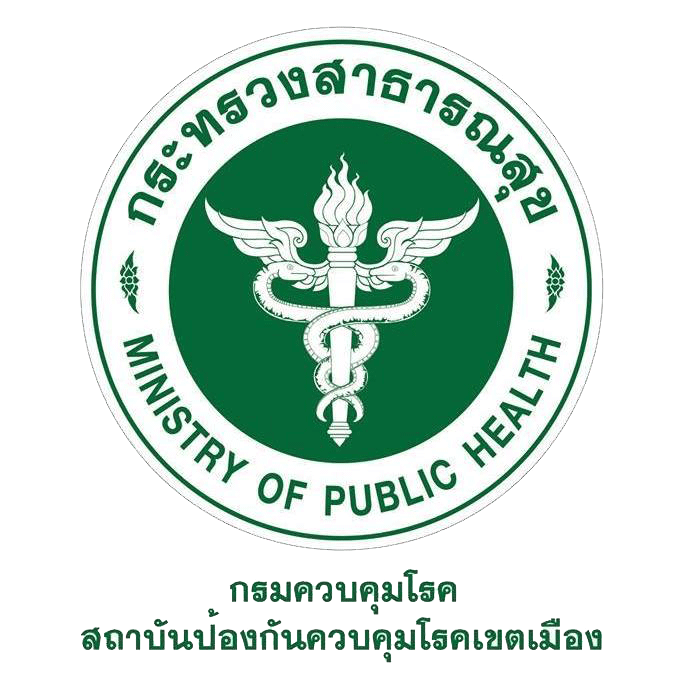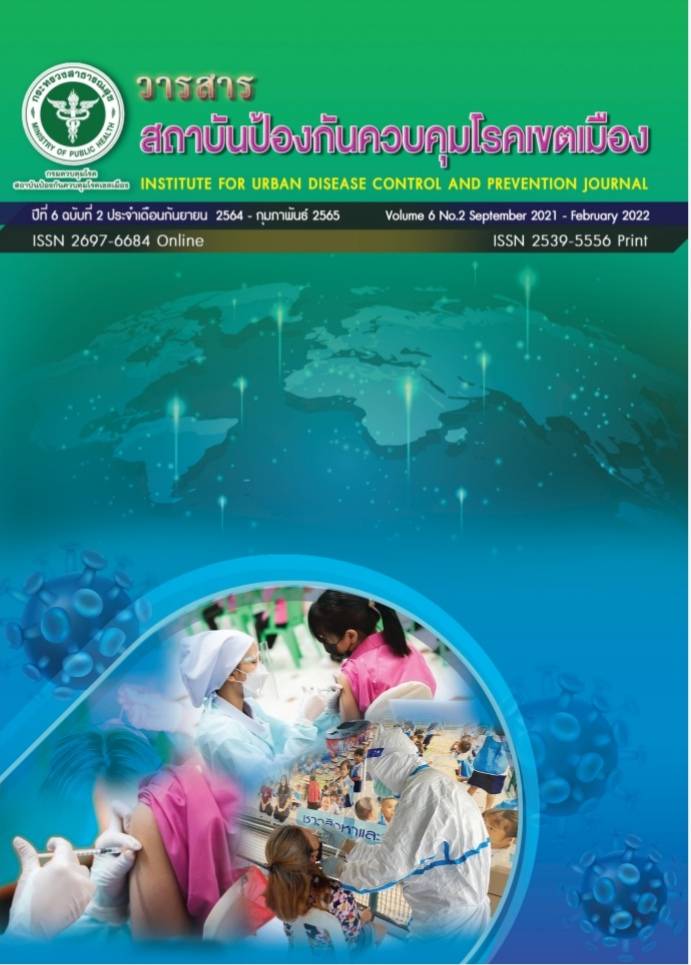การมีส่วนร่วมในการป้องกันควบคุมโรคติดเชื้อไวรัสโคโรนา 2019 ของทหารอาสาสมัคร ในสถานกักกันโรคแห่งรัฐ กรุงเทพมหานคร
Main Article Content
บทคัดย่อ
ศูนย์บริหารสถานการณ์โรคติดเชื้อไวรัสโคโรนา 2019 (โควิด-19) กำหนดให้ผู้ที่เดินทางมาจากต่างประเทศทุกคนต้องได้รับการตรวจคัดกรอง แยกกัก หรือกักกัน ในสถานกักกันโรคแห่งรัฐเพื่อการเฝ้าระวังป้องกัน และควบคุมโรคติดเชื้อไวรัสโคโรนา 2019 ตามหลักเกณฑ์ และแนวทางการควบคุมป้องกันโรคโดยความร่วมมือระหว่างกระทรวงกลาโหม และกระทรวงสาธารณสุข การดำเนินงานในสถานกักกันโรคแห่งรัฐจะสำเร็จได้ต้องอาศัยการมีส่วนร่วมของบุคลากรทุกระดับ
การศึกษาแบบพรรณนา เพื่อศึกษาการมีส่วนร่วมในการป้องกันควบคุมโรคติดเชื้อไวรัสโคโรนา 2019 ของทหารอาสาสมัคร กลุ่มตัวอย่างได้รับการคัดเลือกแบบเฉพาะเจาะจง คือทหารอาสาสมัครที่ปฏิบัติงานในสถานกักกันโรคแห่งรัฐ กรุงเทพมหานคร จำนวน 289 คน ใช้แบบสอบถามเป็นเครื่องมือในการเก็บรวบรวมข้อมูล ระหว่างเดือนพฤษภาคม ถึงเดือนกรกฎาคม 2563 ได้รับแบบสอบถามกลับที่มีความสมบูรณ์ 278 ฉบับ (ร้อยละ98.6)
ผลการวิจัยพบว่าระดับการมีส่วนร่วมในการป้องกันควบคุมโรคติดเชื้อไวรัสโคโรนา 2019 โดยรวมและรายด้าน คือด้านการร่วมวางแผน ด้านการร่วมดำเนินการ และด้านการร่วมประเมินผล อยู่ในระดับสูง ตัวแปรความรู้เกี่ยวกับโรคติดเชื้อไวรัสโคโรนา 2019 อยู่ในระดับปานกลาง แรงจูงใจในการปฏิบัติงานป้องกันควบคุมโรคติดเชื้อไวรัสโคโรนา 2019 อยู่ในระดับสูงความรู้เกี่ยวกับโรคติดเชื้อไวรัสโคโรนา 2019 มีความสัมพันธ์ทางบวกระดับตํ่ากับการมีส่วนร่วมในการป้องกันควบคุมโรคติดเชื้อไวรัสโคโรนา 2019 อย่างมีนัยสำคัญทางสถิติ (r=0.13, p<0.05) แรงจูงใจในการปฏิบัติงานป้องกันควบคุมโรคติดเชื้อไวรัสโคโรนา 2019 มีความสัมพันธ์ทางบวกระดับสูงกับการมีส่วนร่วมในการป้องกันควบคุมโรคติดเชื้อไวรัสโคโรนา 2019 อย่างมีนัยสำคัญทางสถิติ (r=0.76, p<0.001)
ข้อเสนอแนะจากการวิจัย การบริหารจัดการป้องกันควบคุมโรคติดเชื้อไวรัสโคโรนา 2019 ในสถาน
กักกันโรคแห่งรัฐ ผู้มีส่วนเกี่ยวข้องทุกระดับควรมีส่วนร่วมในการกำหนดทิศทาง วางแผนพัฒนาการ
ดำเนินงาน ป้องกันควบคุมโรคติดเชื้อไวรัสโคโรนา 2019 ร่วมกัน ส่วนการบริหารจัดการทรัพยากรบุคคล
ควรมีการสร้างแรงจูงใจในการปฏิบัติงาน เช่น การให้ค่าตอบแทนที่เหมาะสม ค่าเสี่ยงภัย ค่าเบี้ยเลี้ยง
การเลื่อนขั้นเงินเดือน การเลื่อนตำแหน่งที่สูงขึ้น เพื่อเป็นขวัญและกำลังใจ กระตุ้นให้ผู้ปฏิบัติงานมีส่วนร่วมในการดำเนินงานป้องกันควบคุมโรคติดเชื้อไวรัสโคโรนา 2019 อย่างมีประสิทธิภาพ
Article Details

อนุญาตภายใต้เงื่อนไข Creative Commons Attribution-NonCommercial-NoDerivatives 4.0 International License.
บทความที่พิมพ์ในวารสารสถาบันป้องกันควบคุมโรคเขตเมือง ถือว่าเป็นผลงานวิชาการ งานวิจัยและวิเคราะห์ ตลอดจนเป็นความเห็นส่วนตัวของผู้เขียนเอง ไม่ใช่ความเห็นของสถาบันป้องกันควบคุมโรคเขตเมือง หรือคณะบรรณาธิการแต่ประการใด ผู้เขียนจำต้องรับผิดชอบต่อบทความของตน
เอกสารอ้างอิง
2. กรมควบคุมโรค กระทรวงสาธารณสุข. โรคติดเชื้อไวรัสโคโรนา 2019 (COVID-19). [อินเทอร์เน็ต] [เข้าถึงเมื่อ 25 ตุลาคม 2564]; เข้าถึงได้จาก https://ddc.moph.go.th/viralpneumonia/index.php
3. กรมควบคุมโรค กระทรวงสาธารณสุข.โรคติดเชื้อไวรัสโคโรนา 2019. [อินเทอร์เน็ต] [เข้าถึงเมื่อ 25 ตุลาคม 2564]; เข้าถึงได้จาก https://ddc.moph.go.th/viralpneumonia/file/g_km/handout001_12032020.pdf
4. จันทิมา นวะมะวัฒน์, วิภาพร สิทธิสาตร์, กฤษฎา เหล็กเพชร, ไพศาล เธียรถาวร. การมีส่วนร่วมของอาสาสมัครสาธารณสุขและชุมชนในการป้องกันและเฝ้าระวัง โรคติดเชื้อไวรัสโควิด 19 โดยใช้ระบบสารสนเทศทางภูมิศาสตร์. สถาบันวิจัยระบบสาธารณสุข;2564.
5. ธีรวุฒิ เอกะกุล. ระเบียบวิธีวิจัยทางพฤติกรรมศาสตร์และสังคมศาสตร์. อุบลราชธานี: สถาบันราชภัฏอุบลราชธานี; 2543.
6. บุญธรรม กิจปรีดาบริสุทธิ์. ระเบียบวิธีวิจัยทางสังคมศาสตร์. กรุงเทพมหานคร: จามจุรีโปรดักท์; 2551.
7. Kaufman HF. Participation in Organization Activities in Selected Kentucky Localities. Agriculture Experiment Station Bulletin 1949.
8. ศิริวรรณ เสรีรัตน์ และคณะ. พฤติกรรมองค์กร. กรุงเทพมหานคร: บริษัทธีระฟิมล์และไซเท็กซ์ จำกัด; 2541.
9. เบญจมาภรณ์ อิศรเดช. หลักการจัดการ. กรุงเทพมหานคร: แมค-กรอฮิล; 2549.
10. ปิยธิดา ตรีเดช. การนิเทศงานสาธารณสุข. กรุงเทพมหานคร: คณะสาธารณสุขศาสตร์ มหาวิทยาลัยมหิดล; 2552.


